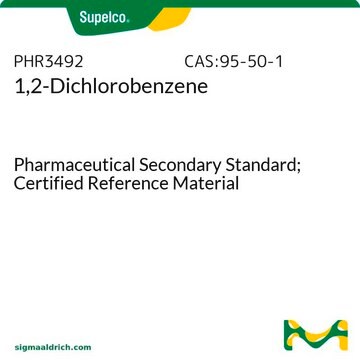D39002
1,2-Dibromobenzene
98%
Synonym(s):
o-Dibromobenzene
About This Item
Recommended Products
vapor density
8.2 (vs air)
Assay
98%
form
liquid
refractive index
n20/D 1.611 (lit.)
bp
224 °C (lit.)
mp
4-6 °C (lit.)
density
1.956 g/mL at 25 °C (lit.)
SMILES string
Brc1ccccc1Br
InChI
1S/C6H4Br2/c7-5-3-1-2-4-6(5)8/h1-4H
InChI key
WQONPSCCEXUXTQ-UHFFFAOYSA-N
Looking for similar products? Visit Product Comparison Guide
General description
Application
- Selective Covalent Capture of Collagen Triple Helices with Minimal Protecting Group Strategy: This study details the use of Rink Amide MBHA resin for capturing collagen triple helices, highlighting its efficiency in solid-phase synthesis (JDH Le Tracy Yu, 2020).
- Solid phase peptide synthesis: new resin and new protecting group: Introduction of a novel resin, Fmoc-Rink-Amide PEG Octagel, showcasing its application in peptide synthesis (S Ramkisson, 2018).
- Development of a novel, automated, robotic system for rapid, high-throughput, parallel, solid-phase peptide synthesis: This paper discusses the utilization of Rink Amide MBHA resin in developing an automated system for peptide synthesis (K Kiss et al., 2023).
- Synthesis of Peptoids Containing Multiple Nhtrp and Ntrp Residues: A Comparative Study of Resin, Cleavage Conditions and Submonomer Protection: The study compares different resins including Rink Amide MBHA, analyzing their efficacy in peptoid synthesis (A Lone et al., 2020).
- diborylbenzenes via palladium-catalyzed borylation of bromobenzenes
- o,o′-tri- and -tetrasubstituted biphenyls via aryne cross-coupling reaction
Signal Word
Warning
Hazard Statements
Precautionary Statements
Hazard Classifications
Aquatic Chronic 2 - Eye Irrit. 2 - Skin Irrit. 2 - STOT SE 3
Target Organs
Respiratory system
Storage Class Code
10 - Combustible liquids
WGK
WGK 3
Flash Point(F)
197.6 °F - closed cup
Flash Point(C)
92 °C - closed cup
Personal Protective Equipment
Certificates of Analysis (COA)
Search for Certificates of Analysis (COA) by entering the products Lot/Batch Number. Lot and Batch Numbers can be found on a product’s label following the words ‘Lot’ or ‘Batch’.
Already Own This Product?
Find documentation for the products that you have recently purchased in the Document Library.
Customers Also Viewed
Our team of scientists has experience in all areas of research including Life Science, Material Science, Chemical Synthesis, Chromatography, Analytical and many others.
Contact Technical Service













